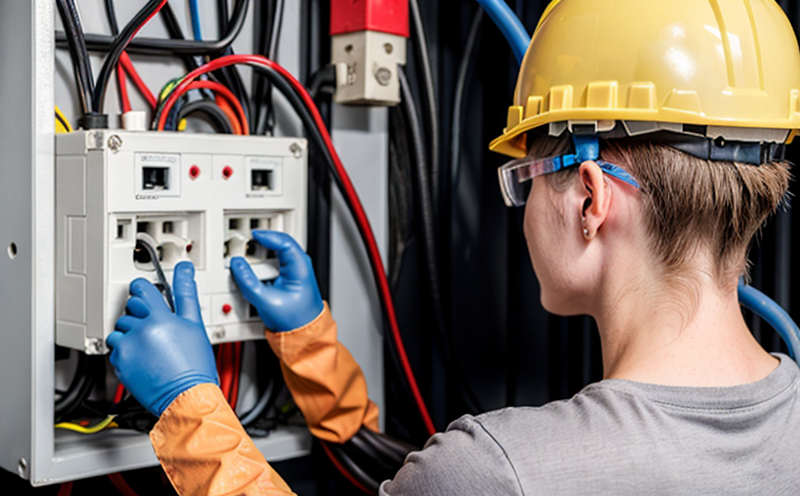EN 50136 Alarm Transmission Systems Electrical Safety Assessment
The European standard EN 50136 is a crucial document that provides specifications and test procedures for alarm transmission systems, particularly in the context of electrical safety. These systems are designed to ensure the reliable operation of fire and security alarms within buildings. The standard ensures that these devices function correctly under various environmental conditions while maintaining high levels of electrical safety.
The EN 50136 standard is composed of several parts, with Part 4 focusing specifically on the electrical safety assessment of alarm transmission systems. This part establishes a framework for assessing the electrical performance and safety aspects of such systems to ensure they meet stringent European regulatory requirements. The primary goal of this standard is to protect individuals from potential hazards associated with faulty or improperly designed electrical components.
The testing process outlined in EN 50136 involves multiple stages, each aimed at evaluating different aspects of the alarm transmission system's performance and safety. These stages include:
- Inspection: A thorough visual inspection to identify any obvious defects or damage that could affect the system’s functionality.
- Functional Testing: Verifying that all components operate as intended according to their design specifications.
- Electrical Safety Assessment: This is where Eurolab excels, ensuring the system complies with EN 50136-4 requirements. It involves testing for insulation resistance, earth continuity, and other parameters critical for electrical safety.
The electrical safety assessment is a vital component of the overall testing process as it directly impacts public safety by preventing accidents caused by poor electrical design or construction. By adhering to EN 50136-4 standards, manufacturers can demonstrate their commitment to producing safe and reliable products.
Testing according to this standard ensures that alarm transmission systems are capable of functioning reliably in challenging environments while minimizing the risk of fire or injury due to electrical faults. Compliance with these stringent requirements is essential for both commercial and residential applications where security and safety are paramount.
In summary, EN 50136-4 provides a comprehensive approach to assessing the electrical safety of alarm transmission systems. It covers all necessary aspects from initial design through final installation and beyond. By partnering with Eurolab for your EN 50136-4 testing needs, you can rest assured that your products meet the highest standards in terms of electrical safety and compliance.
Eurolab Advantages
At Eurolab, we understand the importance of choosing a partner who not only meets but exceeds industry expectations. Our team of experts brings years of experience in conducting rigorous tests according to international standards like EN 50136-4. Here’s why working with us is beneficial:
- Comprehensive Testing Capabilities: We offer a wide range of testing services tailored specifically for alarm transmission systems, ensuring you receive comprehensive coverage.
- State-of-the-Art Equipment: Our laboratory is equipped with advanced instruments and tools that allow us to perform precise and accurate tests.
- Experienced Technicians: Our staff comprises highly qualified professionals who possess extensive knowledge in electrical safety assessment.
- Rapid Turnaround Times: We pride ourselves on delivering quick results without compromising quality, allowing you to stay ahead of schedule.
- Confidentiality: Your data and test results are kept secure and confidential at all times.
- Custom Solutions: Whether you need standard tests or customized solutions specific to your product’s requirements, Eurolab can provide personalized services.
By partnering with us, you gain access not only to world-class facilities but also expert guidance throughout the entire testing process. This ensures that every aspect of your alarm transmission system is thoroughly evaluated and certified compliant with EN 50136-4 standards.
Quality and Reliability Assurance
The quality and reliability of our services are paramount at Eurolab. We employ a rigorous quality management system that ensures every test conducted adheres to strict guidelines set forth by international standards such as ISO 9001:2015. This commitment translates into consistent, accurate results that you can trust.
Our approach begins with meticulous preparation of the specimens being tested. Each piece undergoes thorough cleaning and conditioning according to specific procedures defined in EN 50136-4. Only after this preparatory stage do we proceed with actual testing to ensure no variables skew our findings.
In addition to ensuring accurate specimen preparation, Eurolab also invests heavily in maintaining cutting-edge technology and equipment necessary for precise measurements during the electrical safety assessment portion of the test procedure. Our commitment extends beyond just performing tests; it includes providing detailed reports that outline all findings clearly so you understand exactly what was tested and how your product performed.
At Eurolab, we take pride in delivering top-notch quality assurance services that go above and beyond industry norms. With a focus on precision, accuracy, and reliability, our goal is to give you peace of mind knowing your products are not only compliant with EN 50136-4 but also ready for deployment in real-world scenarios.
Environmental and Sustainability Contributions
At Eurolab, we recognize the importance of contributing positively to environmental sustainability while providing high-quality testing services. Our commitment extends beyond just meeting regulatory requirements; it includes adopting practices that reduce our ecological footprint and promote sustainable development.
To achieve this goal, we implement several measures:
- Energy Efficiency: We strive to minimize energy consumption by optimizing laboratory operations and using efficient lighting systems.
- Waste Reduction: By recycling materials whenever possible and adopting waste minimization strategies during specimen preparation and testing processes, we significantly reduce landfill contributions.
- Water Conservation: Our laboratories are designed to use water-efficient fixtures and practices, reducing overall consumption where feasible.
- Material Selection: When selecting supplies for our operations, preference is given to eco-friendly options that have minimal environmental impact throughout their lifecycle.
Incorporating these sustainable practices into daily activities aligns with broader goals of corporate social responsibility (CSR). Through continuous improvement initiatives and adherence to best practices in green manufacturing, we aim to set an example for others within the industry. By doing so, we contribute towards creating a healthier planet while delivering exceptional value through reliable testing services.





